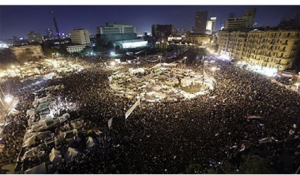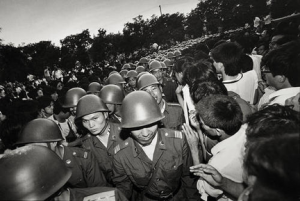Memo 59 (Part 1)
*See Part 2 of Memo 59 by Daniel Bell*
By Earl Drake (Canadian Ambassador in Beijing in 1989) – earl.drake [at] ubc.ca
 At first glance there are many similarities: huge crowds (including many young people) demonstrate peacefully in the main square of the capital city against a repressive government that has been in power for a long time; the crowd has no clearly defined leaders; and the military allows the demonstrations to continue over an extended period of time.
At first glance there are many similarities: huge crowds (including many young people) demonstrate peacefully in the main square of the capital city against a repressive government that has been in power for a long time; the crowd has no clearly defined leaders; and the military allows the demonstrations to continue over an extended period of time.
As we all know, the endings were dramatically different in the two cases. In my view, this was because the ultimate authority in Egypt (the Army) signaled early on that it would not use force against peaceful and orderly demonstrators. On the other hand, the ultimate authority in China (the Communist Party) signaled clearly that it would take lethal action if the protests continued for a prolonged period.
In Cairo, the president of Egypt resigned 18 days after protesters began demanding his departure. In Beijing, the protesters were allowed to occupy their square peacefully from April 17 until May 19 when the ruling party began giving them a series of unmistakable warnings that the army would use force if they did not return home within a few days. On May 19, the general secretary met student representatives face to face and pleaded with them to disperse because he could no longer protect them. The next day, the premier declared martial law. On May 25, the official media branded the demonstrators as “counter-revolutionaries” i.e., enemies of the ruling party. On June 3, soldiers began using tear gas against students. Finally, at dawn on June 4, the army began firing live ammunition at all who opposed their march on Tiananmen Square.
In the Arab case, the army itself wielded the power and gave subtle signals of encouragement to protesters. In the Chinese case, the ruling party held the power and gave several unsubtle warnings before it ordered the army to use force.
Link:
- A Stubble-Jumper in Striped Pants: Memoirs of a Prairie Diplomat, October 1999 (Earl Drake autobiography)
Related Memos:
- Our other Memos about China and the Middle East
- Our collection of Memos on the Origins of Social Protests in China

